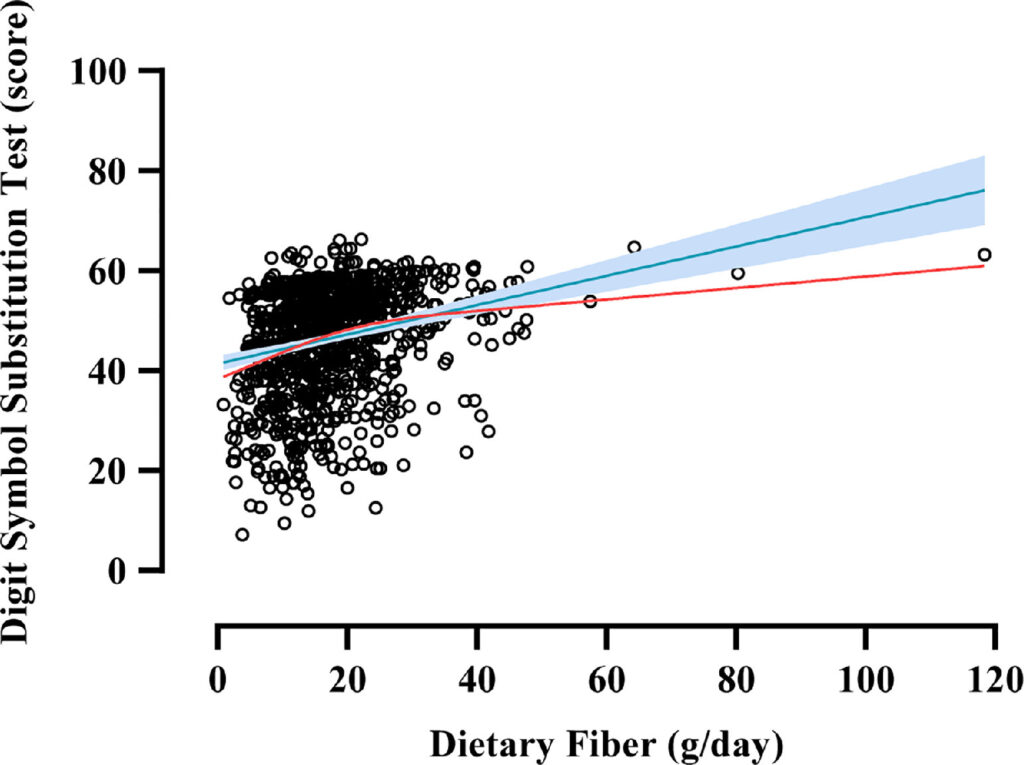Aging is associated with the degradation of the structure of the brain. As a result, cognitive function deteriorates, dementia develops, and it becomes difficult for older people to perform even daily tasks. Brain degradation is manifested in the following:
- decrease in the speed of movements;
- deterioration of manual dexterity and fine motor skills;
- impaired ability to write and draw;
- slowing down visual perception;
- difficulties in maintaining balance.
It becomes more difficult for the elderly to adapt to new conditions due to decreased working memory, concentration, and learning ability.
A study conducted at universities in the UK showed a direct relationship between the amount of fiber (insoluble dietary fiber) consumed in old age and the preservation of brain function. The scientists analyzed data from people over 60 who participated in the US National Health and Nutrition Survey. The survey was conducted from 2011 to 2014, and the number of elderly participants was 1070. The average age of the participants is 69 years. The researchers used a cut-off age of 60 because that is the age at which the cognitive dysfunction typically seen in older people accelerates.
Study Design
The researchers used data on the daily eating patterns of survey participants. The results of their cognitive tests were also analyzed. These tests are used in clinical neuropsychology. Several tests assessed specific functions: fluency, learning and memorizing words. Another trial, digital character replacement, evaluated the state of cognitive function in a wide range, which is affected by many areas of the brain and is associated with the ability to perform everyday tasks.
Based on USDA food data used for dietary research, scientists calculated the daily intake of individual nutrients. And then, they figured out the relationship between the amount of dietary fiber consumed and the results of cognitive tests. The calculation was done with adjustments for many factors: age, gender, race, level of education and income, medical history, body mass index, daily calorie intake, and alcohol consumption.
The analysis was carried out for three age groups:
- 60-69 years old;
- 70-79 years old;
- 80 years and older.
Research Results
After adjusting for socio-demographic, anthropometric, nutritional, and medical factors, there was no relationship between the amount of fiber intake and the results of tests assessing specific cognitive functions: fluency, learning and memory of words.
However, such dependence was observed for the Digit Symbol Substitution Test (DSST). The relationship is initially approximately linear and then reaches a plateau when the daily intake of dietary fiber reaches 34 grams:
Image source: https://www.amjmed.com/article/S0002-9343(22)00258-3/fulltext
The result of the Numerical Symbol Substitution Test (DSST) is a good description of a person’s ability to perform everyday tasks. The test considers brain damage, associative learning, the quality of verbal thinking, working memory capacity, and a wide range of brain executive functions. The clinical goal of DSST is not a diagnosis but rather the detection of a disorder, regardless of its nature and origin, and the detection of cognitive changes in an individual.
Study Disclaimer
Several studies have identified a relationship between dietary fiber intake and cognitive function in older adults. For example, a 13-year study by French scientists found a decrease in brain function in older French women who prefer desserts and ice cream and eat insufficient amounts of vegetables – a source of fiber.
However, the UK study is the first to show high results in DSST due to higher dietary fiber intake. The study showed that the elderly, consuming enough fiber, have higher information processing speed, attention and working memory levels, all of which characterize the executive function of the frontal lobes of the brain.
The study confirmed that a diet high in insoluble dietary fiber could reduce age-related cognitive impairment. Adding fiber to your diet is an effective non-pharmacological way to combat an age-related decline in brain function.
In the US, the average daily intake of dietary fiber is 17.3 grams. Moreover, about 90% of women and 97% of men consume less than the recommended fiber level, as stated in the Dietary Guidelines for Americans 2020-2025, released by the US Department of Agriculture and the US National Institutes of Health. Therefore, to maintain the cognitive health of the elderly, it is necessary to promote sufficient daily fiber intake.
Conclusions
Desserts and ice cream instead of vegetables contribute to age-related cognitive decline, especially in people after 60 years of age, when the degradation of brain functions accelerates.
34 grams of fiber per day will help maintain the ability to perform daily tasks in old age.
Useful article, necessary information? Share it!
Someone will also find it useful and necessary:




